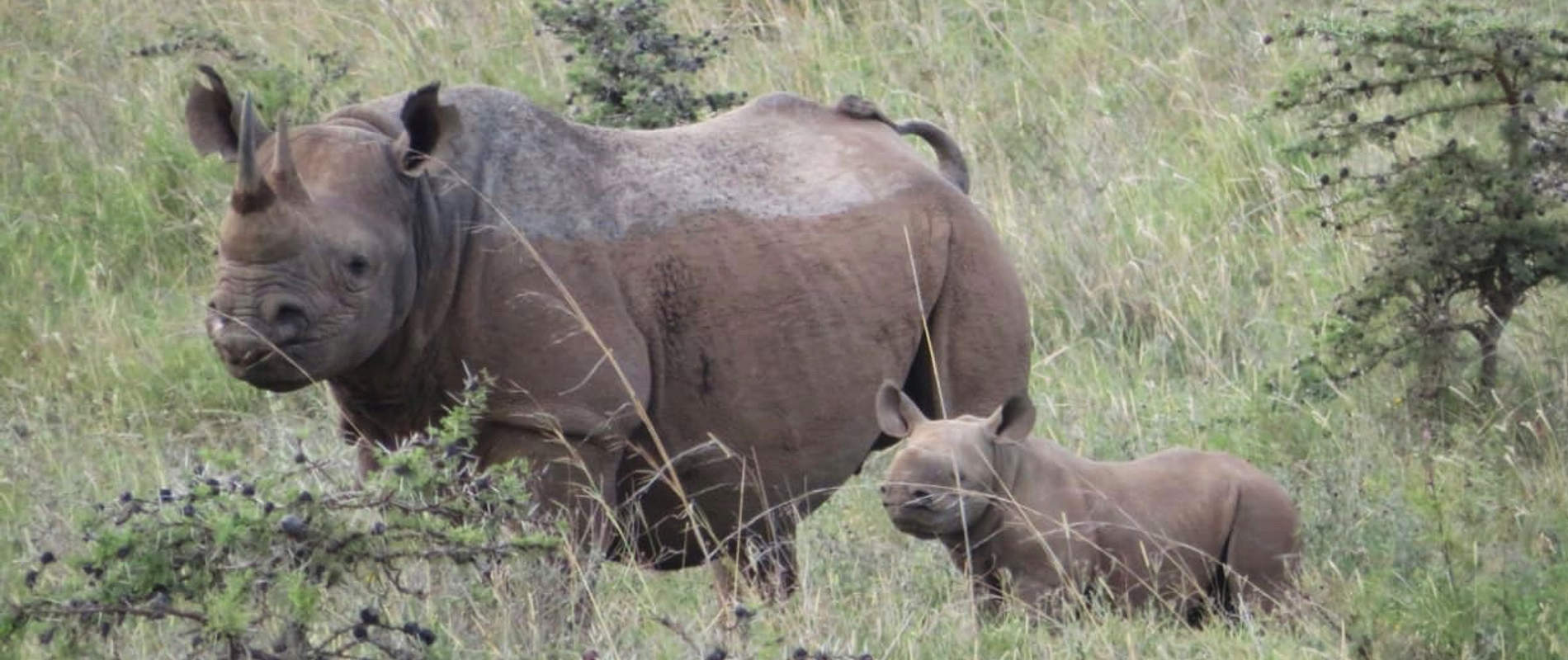Kenya’s black rhino population just got bigger: Solio has given birth to her second calf, a healthy baby girl, in Nairobi National Park! Her new addition is named Savannah.
Savannah’s birth is a triumph, both for rhino conservation and for one very special individual. Solio’s story began in 2010, when we received reports of a mortally wounded female rhino on Solio Ranch. At the time, the demand for rhino horn was at an all-time high, and Solio Ranch was ruthlessly targeted by poachers. This female was almost certainly one of their victims.

Solio in 2010, shortly after her rescue and still very frightened
To compound the tragedy of the situation, she left a young calf behind. Based on reports, we were expecting a small orphan, so we assembled four of our most experienced Keepers and flew them north to Laikipia. Upon arriving at the scene, however, the team discovered that she was actually quite a bit older than anticipated — and extremely feisty, at that! Transporting her via plane was out of the question, so we quickly changed course.
The plane returned empty and we organised a truck in its stead. Meanwhile, two Keepers remained behind with their young charge. When they prepared for this rescue, they had certainly not envisioned an overnight stay on a freezing airstrip, accompanied by a very aggressive rhino!

With time, Solio became absolutely hooked on her Keepers
Solio was quite ferocious when she arrived at the Nursery. She clearly craved love, but was too afraid to accept it from her Keepers. We fashioned a bottle brush strapped onto a long stick, which allowed them to shower her with affection, without risking life and limb in the process. This had the desired effect, and then some: Within weeks, Solio was completely hooked on her Keepers. Whenever she saw them approaching, she would flop onto the ground, entreating them to give her a cuddle.

She grew up at the Nursery and eventually reintegrated into Nairobi National Park
As we always say, orphaned rhinos are easier to raise than elephants, but far more difficult to reintegrate. They are a highly territorial species, so the entire process must be done with great care. From the outset, Solio’s Keepers took her on daily walks through Nairobi National Park, frequenting the dung piles and urinals of wild rhinos. This allowed the resident population to become aware of her presence, slowly building acceptance. As the years passed, Solio grew more independent and earned her place among Nairobi National Park’s black rhino community.

In September 2019, Solio gave birth to Sultan
Given the complexities of reintegrating rhinos, we were overjoyed when Solio became a first-time mother in 2019. She partnered with a dominant male in the park, producing a beautiful baby boy, named Sultan. For any orphaned creature, but particularly rhinos, wild-born offspring are the best possible measure of a successful reintegration.
And now, Solio’s family has grown by one. On 31st January 2022, KWS Rangers spotted her with a newborn calf by her side. This time, she has given birth to a baby girl, named Savannah. At two and a half, Sultan is rapidly growing in independence, but he has been spotted hanging out with his mum and little sister.

Savannah makes Solio a mum two times over
Everything about Solio is a triumph for her species. In the 1960s, Kenya was home to a robust population of 20,000 black rhinos. Poachers decimated the species, and just two decades later, their numbers had dwindled to 300. Solio Ranch was their last hope. A handful were introduced to the protected landscape in Laikipia, and over the years, their numbers blossomed across the country. Today, many of Kenya’s black rhinos can be traced back to this base population.

We are delighted to witness this growing family, and the growing black rhino population in Kenya
Like the birthplace that earned her her name, Solio is creating the next generation of black rhinos. Thanks to dedicated conservation efforts, Kenya is now home to 938 black rhinos. By bringing two calves into the world, Solio has made a momentous contribution to this burgeoning population. Sultan and Savannah will go on to bear their own offspring, who will go on to have their own, and so on — and to think, it all began with Solio. We are proud to be part of this remarkable rhino’s story, saving one life and helping to forge a future for the entire species.
